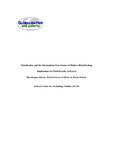| dc.description.abstract | Agricultural biotechnology in Kenya is characterised by low-technology applications such as
biofertilisers, micropropagation and use of molecular assisted selection (MAS), however, and
the country is experiencing an increased number of agricultural R&D activities in high-tech
biotechnology options. These include work on transgenic sweet potato, Bt maize and
recombinant DNA livestock vaccines and diagnostics. The introduction of these applications
in Kenya has stimulated debate on globalisation issues (including equity and governance of
IPRs, biosafety, investments and trade) and their potential impacts on food security in the
country.
This study uses secondary literature and a case study approach to review elements of
globalisation and international governance of modern agricultural biotechnology and to
assess their potential impact on the local and national food security in Kenya. The report
provides some background to the agriculture and food production trends in Kenya in Section
2. This is followed by an analysis of the policy and institutional context for agricultural
biotechnology in Kenya. Section 4 reviews some of biotechnology programmes and
regulations that have recently been introduced into Kenya, or are being considered as means
of alleviating food insecurity in the country. Section 5 briefly describes two case studies of
agricultural biotechnology introductions, namely transgenic sweet potato and Bt Maize. The
cases were selected because they represent biotechnology R&D-inspired innovation process,
which challenges the traditional role of the state and of rural livelihoods, as we know them
today. In Section 6, we examine how the transfer of transgenic sweet potato and Bt Maize to
Kenya have contributed to the national agricultural biotechnology policy and regulations, and
their potential impacts on food security in the country. The report concludes with a summary
of key issues and lessons learned. | en_US |

